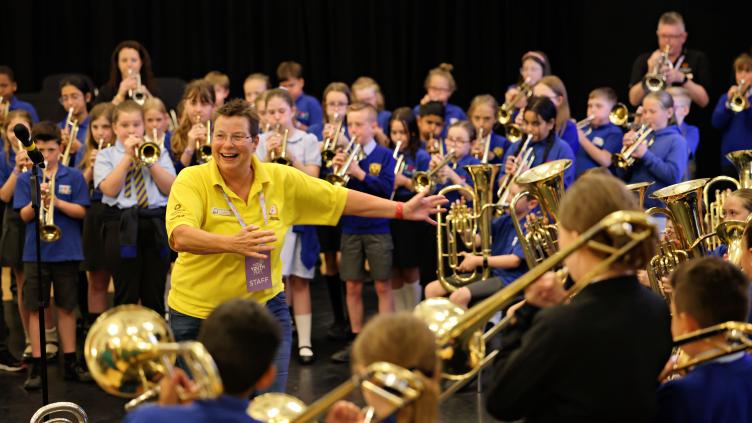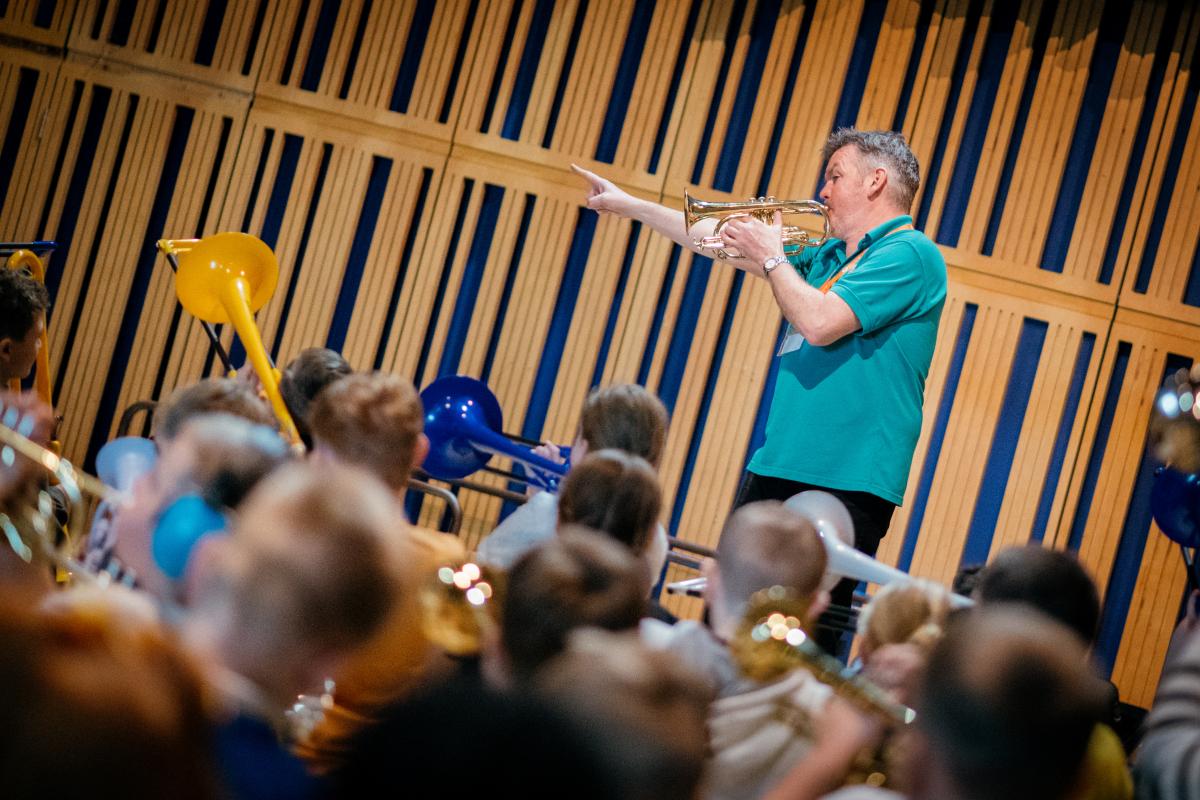
In this resource for brass music teachers, award-winning brass educator (and BBE’s own Youth Development Brass Specialist), Helen Minshall, shares advice for those educators preparing for a new academic year of brass tuition and music-making.
What could be more exciting than the start of a new academic year, looking to the future with a group of children eager to begin their musical journeys!
Whether you’re a class music teacher, a peripatetic teacher, a private teacher or a band leader, there’s an exciting year ahead. With a little bit of forward planning, you can be very well prepared to get a new term of brass tuition underway and avoid any stress.
Introducing the instruments
You may be preparing to teach a full-class brass project, in which case you’re probably working for a music service. Hopefully they will have checked the instruments over prior to delivering them to your school. It’s still advisable to allow plenty of time prior to delivering your first session as there will inevitably still be sticky valves – especially if instruments have been in storage. It would be good to make sure mouthpieces have been thoroughly cleaned.
You might find yourself giving a demonstration in a school assembly, or to a particular class. It’s good to share a brief overview of the instruments on offer, and either play a short demo on each, or show short video clips of the instruments in action. You will then need a letter or leaflet for the children to take home, clearly explaining the offer of brass lessons in school.
Communication with parents and guardians
Here’s some key information you may wish to share with parents and guardians at this stage:
- When, where and how long the lesson is (include if it takes place during lesson time/lunchtime/after school).
- Whether it’s an individual or group lesson.
- How to book the lessons.
- The cost of lessons and whether to pay the school or teacher directly.
- Any instrument hire fees.
- The name of any tutor book(s) they may need.
- Any relevant information about a school or community band the child could attend to support their learning.
I would always advise parents not to buy or hire an instrument immediately. This is because you need a chance to work out which instrument is the best fit for the child.
Assigning brass instruments
Sizing children up for the most suitable instrument is an important skill that most experienced brass teachers have developed over the years.
To start, make sure the child can hold the instrument comfortably and carry it around easily. When testing children, I usually start with a cornet or trumpet and work downwards. See which one the child looks and feels most comfortable with, and check if they can play a low C with ease. If you are teaching a group of mixed instruments it’s most practical to have them all in the same key e.g. cornets and baritones.
Getting ready for the first day
If you’re really organised, you may well have done your recruitment sessions before the summer holidays. In this case, your small group/individual children may already have been selected and be all set up with instruments ready to go.
Make sure you have all the resources you and your students need ready. For example:
- If you’re using a tutor book, try to ask families to buy it over the summer holidays ready for the start of term.
- If you have worksheets of your own, ensure you have plenty of copies.
- Prepare an information sheet telling students and parents how to look after the instrument (e.g. valve oil) and what is expected of them regarding practice.
- Some music services have practice diaries, or you could just ask them to provide a small notebook so they have a record of what they’re working on.

What to play?
There are lots of good resources for beginner brass players. Many children really enjoy playing simple tunes along with backing tracks, which help to make them fun and satisfying to play. You can download backing tracks onto a tablet or phone. Use an app such as AnyTune Pro to slow them down, speed them up or change the key.
A bluetooth speaker is an excellent piece of kit. They are not expensive and you can get a fairly small one that can pack a punch and be heard above a class of brass players. A fun warm-up activity with primary children is to put a march on and get them to march along in time with the music, picking up imaginary instruments on the way.
Setting the tone – put your friendliest foot forward!
If you’re inviting a new cohort of children to your band for the first time, it’s important to be well prepared. Try to make the environment as welcoming and friendly as possible. Encourage parents to stay, especially in the initial stages. Perhaps provide refreshments, and an area for them to sit and listen. Other tips for setting up the room:
- Make sure you’ve set the band room up before the children arrive, with chairs and stands all laid out ready so you can make a prompt start when they arrive.
- Have an area for instrument cases to be left and make sure there are no tripping hazards.
- Have plenty of helpers on hand to support the new beginners - tutors or perhaps some older children - who can help with sticky valves etc.
- Start and finish your rehearsal with something exciting, guaranteed to bring a smile to children’s faces and make them feel good!
Try to include everyone most of the time. If the cornets are working on something, the trombones could be clapping the rhythm or singing the notes. Never leave a child with nothing to do for more than a minute. A really great incentive is to have a band teddy or mascot of some kind which can be given out each week as a prize for good work. Encourage your band members to bring their brass playing friends from school along to rehearsal too - never miss an opportunity to recruit new players.
Children love to perform, so try to include as many performances as possible each term – even if some of them are just an informal playthrough of the pieces they’ve worked on during rehearsal. Explore opportunities for them to perform in assembly or at school concerts and events. Make them feel special and proud as they celebrate their achievements.
Enjoy the new term, and good luck!